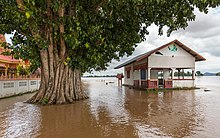Climate risk insurance
Insurance is considered an important climate change adaptation measure.
[5] For low-income countries, these insurance programmes can be expensive due to the high start-up costs and infrastructure requirements for the data collection.
[7] A considerable problem on a micro-level is that weather-related disasters usually affect whole regions or communities at the same time, resulting in a large number of claims simultaneously.
[8] However a well-designed climate risk insurance can act as a safety net for countries while improving resilience.
[6][9] The international community invested in developing further support for this kind of insurance through the InsuResilience Global Partnership launched at COP23.
